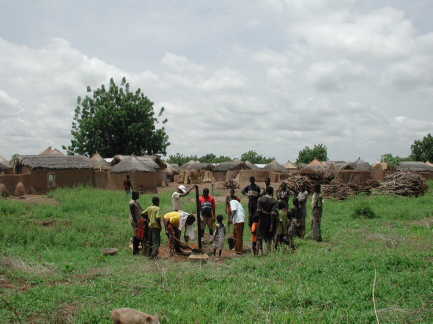The impacts of climate change give small-scale farmers in West Africa a hard time: The rainy season is delayed, sowing is a game of luck, and harvests are cancelled time and again. Climate researchers from the Karlsruhe Institute of Technology (KIT) have now developed methods and models that allow for a more precise forecast and increase the reliability for farmers.
Gerlinde Jung, Patrick Laux, Sven Wagner, and Harald Kunstmann from the Institute of Meteorology and Climate Research analyze climate data for Ghana and Burkina Faso and develop high-resolution regional climate models simulating the water cycle in the atmosphere and land surface. “With them, we can estimate future water availability in West Africa”, explains Harald Kunstmann. Their studies demonstrate that the start of the rainy season has already been delayed by up to 30 days in the past four decades. “This trend will probably continue until 2040”, says Harald Kunstmann. For the Volta basin, the scientists additionally predict an increase in the average annual temperature by another 1.8°C – a value that is far above the expected global average – and a massive decrease in precipitation at the beginning of the rainy season in April.
Due to climate change, farmers may no longer rely on their experience for sowing – and this has serious consequences: If the first raindrops after the dry season are not followed by further precipitation and if the small-scale farmers sow too early, the risk of the seeds drying and the harvest being canceled is increased. If the farmers are too late, the time for the plants to grow is too short and yields are smaller. This does not only affect the farmers and their families, but the constantly growing population in general.
The models of the KIT researchers may mitigate the problem. They are based on complex three-dimensional atmospheric information on humidity flows for instance. In addition, the scientists use statistic methods. According to Kunstmann, these methods can be used with simple data that may also be obtained in this economically underdeveloped region. “Based on pre-rain indices, for example, precipitation sums and the number of rainy days of preceding weeks, we can predict the start of the rainy season with a hit rate of up to 80%”, underlines Patrick Laux.
At a conference and two workshops in Ghana and Burkina Faso, the scientists presented their results and familiarized local decision-makers with the novel methods. “The interest of local experts and decision-makers is enormous”, says Patrick Laux. Long-term cooperation with local meteorological services is envisaged. According to Laux, they are the interfaces for communicating the forecasts of the researchers to rural population.
Research was performed under the GLOWA Volta project and the GLOWA funding program of the Federal Ministry of Education and Research on “Global Change of the Water Cycle”. The project will end in 2009.
The Karlsruhe Institute of Technology (KIT) is the merger of the Forschungszentrum Karlsruhe, member of the Helmholtz Association, and the Universität Karlsruhe. This merger will give rise to an institution of internationally excellent research and teaching in natural and engineering sciences. In total, the KIT has 8000 employees and an annual budget of 700 million Euros. The KIT focuses on the knowledge triangle of research – teaching – innovation.
The Karlsruhe institution is a leading European energy research center and plays a visible role in nanosciences worldwide. KIT sets new standards in teaching and promotion of young scientists and attracts top scientists from all over the world. Moreover, KIT is a leading innovation partner of industry.

